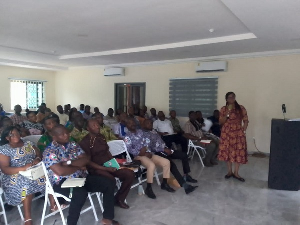The Volta Regional Director of the Ghana Education Service (GES), Francis Yaw Agbemadi, has stated that the new curriculum for the country's educational sector was designed to meet the demands of the 21st century.
According to him, the curriculum was carefully crafted to provide learners and facilitators with the necessary knowledge to contribute to the country's modern development.
"Ghana recognizes the urgent need to revamp our educational curriculum to align with the demands of the 21st century and the Fourth Industrial Revolution. Our interconnected world reflects the consequences of past actions."
"For over a century, nations worldwide have implemented education systems to equip individuals to navigate their environments and contribute to society. Historically, our education system, whether during pre-colonial, colonial, or post-colonial times, has evolved to meet the demands of its respective eras," he said.
The director made these remarks on Thursday during the National Council for Curriculum and Assessment's (NACCA) one-day stakeholders' engagement in Ho for teachers as they prepare to launch the new teaching curriculum for all schools.
He believes that many developed countries have succeeded because their citizens have the necessary skills, and Ghana can achieve this through the new curriculum.
"Countries experiencing rapid and efficient economic growth are those whose citizens possess the required skills, competencies, and values to meet contemporary demands and address national challenges."
"The world has significantly evolved, transitioning from the Stone Age economy to the agrarian economy, through the first industrial revolution's introduction of machines in production, the second with electricity to complement machines, and the third with the invention of computers. Each of these eras required distinct skills, competencies, values, and knowledge to meet their respective demands," he said.
He informed teachers that their expertise, insight, and perspectives are invaluable in refining the new curriculum to ensure it aligns with contemporary educational demands and prepares students for future challenges.
He further added that the Ministry of Education and the Ghana Education Service's efforts aim to address the demands of the 21st century and the Fourth Industrial Revolution, ensuring Ghana's education system remains relevant and forward-thinking.
The new curriculum is set to be learner-centered, allowing pupils to actively participate in teaching activities.
The curriculum has already undergone international review, which is a standard requirement.
Regional News of Friday, 12 July 2024
Source: Albert Kuzor, Contributor

















